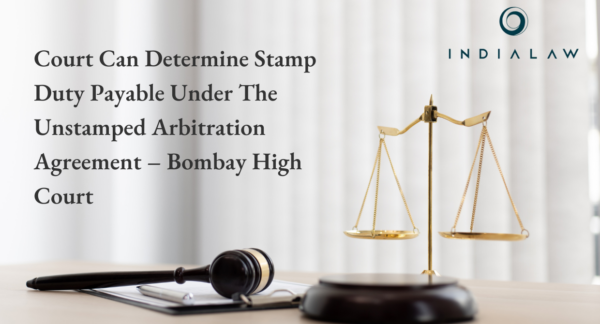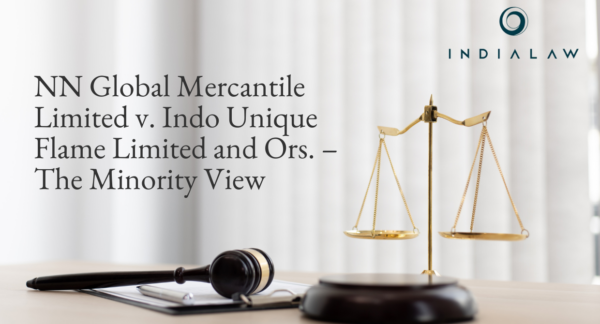Chief Controlling Revenue Authority V. Coastal Gujarat Power Ltd

By Sri Vidya & Eshan Jaipuriar
The issue of stamp duty on the mortgage provided by the borrower of the loan to a security trustee (lead trustee) for the benefit of the other lenders came up before the Supreme Court in the Case of Chief Controlling Revenue Authority v. Coastal Gujarat Power Ltd. [1] The main issue was whether a single mortgage executed in favour of the security trustee for the benefit of several lenders would be treated as a single document or as multiple documents (equivalent to the number of lenders).
Brief Facts:
A company named Coastal Gujarat Power Ltd. (“Company”) needed financial assistance for setting up an Ultra Mega Power Project in the area of Kutch-Bhuj and for that purpose it secured assistance from thirteen lenders, that is, banks and financial institutions. These financial institutions formed a consortium as a trust and executed a security trustee agreement (STA) inter se appointing one banker as the lead trustee, called the security trustee. The Company executed an “Indenture of Mortgage for Delayed after Assets Deed” (“Mortgage Deed”) with the security trustee, mortgaging its assets and registered the document by paying a stamp duty of Rs. 4,21,000/-. The revenue department disputed the same, stating that, the company was liable to pay Rs. 54,62,000/- on the said deed and hence, demanded for the remaining balance amount of Rs. 50,41,000/-.
The issue was forwarded for consideration of the Deputy Collector, Stamp Duty Valuation Organisation, Bhuj-Kutch who held that the Company was liable to pay the deficit stamp duty along with a penalty of Rs.250/-.
The matter was put forth before the full bench of the Gujarat High Court as a Reference Proceeding. The Hon’ble High Court opined that stamp duty was payable on instruments and not on transactions. In the present case, although several transactions were covered in the Mortgage Deed, it cannot be presumed that the transactions would give rise to thirteen different sets of documents. Moreover, the Mortgage Deed only created a relationship between the Company and the Security Trustee, with the former as the Mortgagor and the latter as the Mortgagee. The Mortgage Deed does not create a relationship between the Company and the lending banks. Hence, the Mortgage Deed does not include separate transactions to attract Section 5 of the Gujarat Stamp Act which makes stamp duty on different transactions payable separately.
The State Revenue authorities of Gujarat aggrieved with this decision approached the Supreme Court. The main issue of law before the Apex Court was whether the stamp duty was payable on the document, as a whole or it was payable depending up on several matters or transactions contained in a single instrument.
Decision:
The Supreme Court held that the sole purpose of executing a single Mortgage Deed instead of different set of documents pertaining to different lenders was to evade stamp duty. The Apex Court held that Section 5 of the Gujarat Stamp Act only deals with distinct transactions covered in a single instrument and it is immaterial whether the distinct transactions belong to the same category or different categories.The Supreme Court has relied upon the case of The Member, Board of Revenue v. Arthur Paul Benthall [2] to arrive at this conclusion.
In the present case, thirteen lenders have provided financial assistance to the Company pursuant to separate loan agreements with the Company, details of which have been described in the schedule of the STA.. Thus, the Supreme Court concluded that though the mortgage deed is one single document, since it involves thirteen different transactions, the borrower is liable to pay the stamp duty for each transaction, considering each transaction to be a separate deed. Consequently, the appeal was allowed and the Company was liable to pay deficit stamp duty together with interest as directed by the revenue authorities.
Conclusion
The Mortgage Deed dealt with only one single matter, that is, the mortgage of a single property with one mortgagee. However, the decision taken by the Supreme Court doesn’t give much consideration to the document per se but rather regards “transactions” to be the deciding factors while stamp duty is being levied.This decision of the Apex Court of the country is likely to have far reaching and widespread implications on finance transactions.
[1] Civil Appeal No. 6054 of 2015 (Arising out of S.L.P. (C) No. 32319 of 2013), Decided On- 11.08.2015
[2]The Member, Board of Revenue v. Arthur Paul Benthall, 1955 SCR 842




